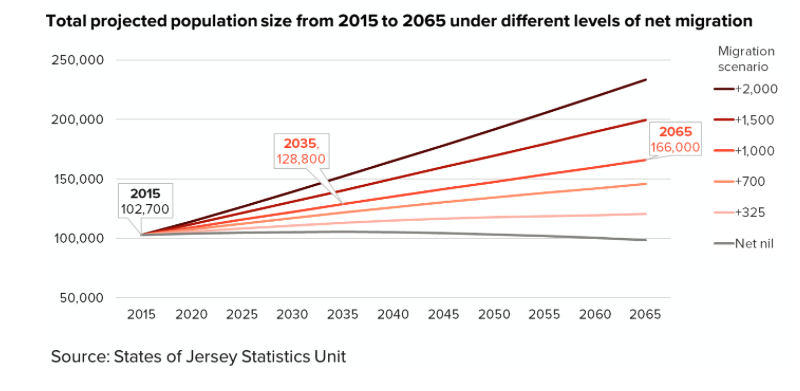

A long-awaited population policy for Jersey was finally published in the dying days of the last Council of Ministers - but it's now been withdrawn following fears over a lack of consultation, and the effect of Brexit.
The issue dogged the previous Council, with "planning assumptions" for the net growth of the island's population being smashed year on year, despite the problem repeatedly being described as a priority. After several false starts in 2017, Ministers finally published a Policy in December, which they wanted to debate in March of this year including tighter criminal records checks, photo ID cards and time-limited visas.
But that debate was pushed back to September, when it would be heard by a new States Assembly.
However in an announcement late last night, the new Chief Minister John Le Fondré said there needed to be more consultation with industry on the plans, to make sure they were the right way forward.

Pictured: Estimations of how the island's population will rise over the coming years.
“Implementing a fair, robust and effective migration policy is essential for the continued economic success of Jersey, for the management of our natural resources, and is a priority for this Council of Ministers.
“That migration policy needs to work for our businesses, for our migrant workers, and for our wider Island community.
“As I outlined in my nomination as Chief Minister, I believe we need greater consultation before we proceed in debating this policy. In particular, Island businesses have concerns over the detail of the scheme, and how work permits may affect their ability to retain important members of staff.
“In addition, we have the impact of Brexit to consider. While the proposals in the policy for a work permit regime would function under different Brexit scenarios, precisely how they would operate will depend on how negotiations are concluded.
“I am determined that the migration policy taken by the Council of Ministers to States Assembly will be the right one, and one that has taken account of the views of all stakeholders.”

Pictured: John Le Fondré announced the withdrawal of the Population Policy yesterday evening.
The latest figures put Jersey’s population at 105,500. Previously Ministers were working to an 'interim' population policy, which sought to limit net migration to 325 people a year. However the figure in recent years regularly exceeded 1,000.
In response, the previous Council of Ministers published a Policy with a combination of time-limited work permits of up to 10 months, enhanced criminal record checks, and photo registration cards, in December.
However, local businesses expressed concern about their ability to be able to recruit the staff they needed to remain prosperous and so support the local economy. Now it appears Ministers share those concerns about the previous Council's policy, and they have taken it back to the 'drawing board.'
A recent Stats Unit report said the local population had increased by 1,300 over the last year and 11,500 over the last decade, while the amount of skilled workers coming to the island has doubled. Although it wouldn't happen for around 40 years, if current trends continue, Jersey population could become about three times the size of Guernsey's which is predicted to flat-line.
Jersey's population was estimated at 105,500 at the end of 2017 - take a look at our infographic for the key figures pic.twitter.com/rhUWaOXDqB
— Statistics Jersey (@JsyStats) June 22, 2018
The Chamber of Commerce - the island's key business lobby group - recently argued that all migration decisions should wait until after Brexit. This morning, President Eliot Lincoln welcomed the government's 'business as usual' approach:
"Businesses plan long term and it is crucial that clear, concise information is relayed to our members, so that despite any hiatus in the transition of Government, the commerce of the island can still function.
"We support the likely deferring of the Migration Policy, due to be debated in September, not least because of the added unknown impacts of Brexit, however this must not be taken as a signal to do nothing. The real test of recruiting staff and acknowledging the issues of population growth remain and this Government must act to assist businesses with both short and long-term recruitment and retention challenges.
"Chamber is continually seeking better dialogue with Government on behalf of its membership. It is vital, that whether there is policy coming forward or not, employers and employees can continue to structure their futures."
Comments
Comments on this story express the views of the commentator only, not Bailiwick Publishing. We are unable to guarantee the accuracy of any of those comments.